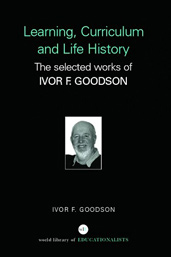Learning, Curriculum and Life Politics: the selected works of Ivor F. Goodson
Coming to Curriculum
Writing in November 1973, I tried out a few of my tentative ideas: for instance on the issue of student autonomy.
After these generalised prophetic justifications, a final justification is that student autonomy may serve to solve some of the educational problems facing contemporary education. The problems of teaching mixed ability groups from differing backgrounds are many and various. Most of these problems, however, are connected with the lack of motivation of students to learn and, closely allied, the questionable relevance of what they are asked to learn. As we have seen, even after new curriculum developments, teachers still consider that they should control every aspect of the student's learning situation. This total monopolisation by teachers I believe to be a major cause of the sense of alienation and disinterest among students. The Monopoly must be broken for student interest to be engaged. To take one instance: teachers are increasingly aware that 'relevance' is an important criterion for consideration in school studies. Teachers are divided from their students by a fast-widening generational gulf and, normally, by the broad abyss of class differences. In this light it is surely manifestly absurd for the teacher to insist on deciding which things are going to appeal to the students on the basis of relevance. Relevance is only one of a number of reasons for learning but, as with many other things, students are better placed than teachers to make judgements upon it. One is not saying that the student should be given the right to decide everything about the learning situation but that the present teacher monopoly of such decisions should be broken. What is needed is a view of learning which sees it as a negotiable, collaborative exercise between teacher and student. The curriculum can then be seen as something that evolves from, on one side, the students' demand for something relevant, useful and interesting, and on the other, the teachers' demand for something which broadens the students' horizons and offers entrance to new ways of understanding (Goodson 1973 (1), p. 8).
The 'students' demands for something relevant did however lead to finite, relatively clear, clusters of interest. One area was their interest in developments within their own community. Major changes were happening in Leicester and the surrounding countryside at this time and the students were eager to know what was happening and to investigate the causes of change. This led on to series of urban and community studies investigations, which I described in some detail at the time (Goodson 1973 (2)).
